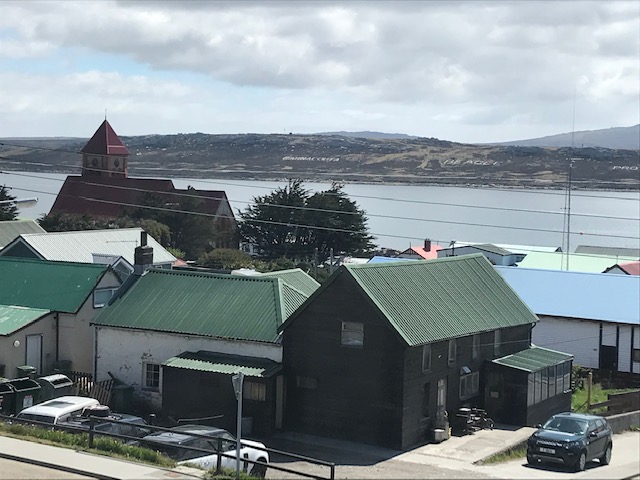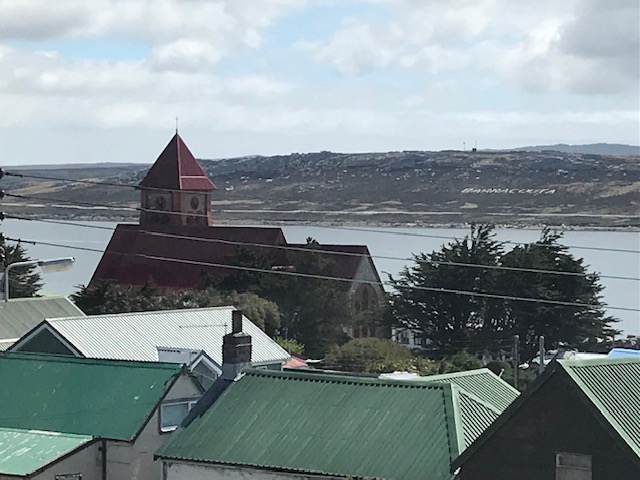Guest blog by Dr Bernadette Paver
Last week the news broke that there is a very real possibility of an effective vaccine for Coronavirus becoming available early next year. Stock markets jumped and although Donald Trump continued his insistence that the US election was rigged in his opponent’s favor no-one seemed to take much notice. All meaty stuff but for the likes of me, a single-handed GP turned OHP living and working in the Falklands in the South Atlantic by far and away the most important news was the news of the vaccine.
I have lived in this far flung British overseas territory (at the southern tip of South America) for over thirty years. Wide open spaces, lots of penguins and sheep and an economy that is based on fishing and tourism. Island life is always a challenge wherever you are but one of the things that makes it bearable is the ability to leave, visit somewhere else and then return home feeling relaxed and relieved that you have chosen this beautiful archipelago as your home. This year it has felt more like a trap.
We had six weeks of lockdown followed by a rapid return to work in May. The fear of ‘is it safe for me to go back to my workplace ‘was evident for a few high-risk patients but the overwhelming feeling was one of relief that life was back to normal. But it soon became apparent that we were not back to normal. We were in the depths of a southern winter, long and dreary, and a time when many Islanders go overseas for a holiday and expats return to their families, but not this year.
As the only occupational health physician in the Islands I had a steady stream of referrals. The six-week lockdown had given many employees time to assess their situation and some were not at all happy with it. Workplace issues that they had dealt with for years seemed to come to a head, with some either resigning or requesting redeployment. We are, of course, talking tiny numbers here as the total population of the Falklands is around 3000. But in a small workforce with too much work to be done the loss of one or two employees in a business or a government department can have a massive effect on those left behind.
The population here is a mixture with expatriate workers from Chile, Peru, Zimbabwe, The Philippines, Australia and the UK. The busiest time of year is the summer while in the winter many people go overseas – this winter they couldn’t. Borders shut and our two flights a week to South America have ceased altogether. The only link we have had for the last six months is a notoriously unreliable RAF fight to the UK once a week. We haven’t suffered any deaths from Coronavirus and have had no cases for six months but the pandemic has had a much more insidious effect. Mental health issues have surfaced, boredom and frustration have led to weight gain and there has been a general feeling of despondency with a sense of nothing to look forward to. Foreign workers have been stuck here for months beyond the end of their contracts leading to anxiety and depression which is particularly difficult to manage. The pandemic has added an extra layer of difficulty to everyday life and for an Island population that is already used to dealing with the difficulties of isolation it has put an added strain on just about everybody.
There have been some secondary benefits. Our broadband supply has improved which means that I have been accessing more webinars and am more inclined to contact colleagues in the UK. However, any secondary gains are quite overshadowed by the daily rather grim feeling of ‘onwards and along’ rather than ‘onwards and upwards’.
But, with the latest news of the vaccine there is at least a vague feeling starting to seep in of hope that maybe next year will be better and we can, once again, jump on a flight to Chile or even fly back to the UK to re-connect face to face with colleagues.
Dr Bernadette Paver is an occupational health physician and SOM member living and working in the Falkland Islands in the South Atlantic. Below, the view from Dr Paver's office.



